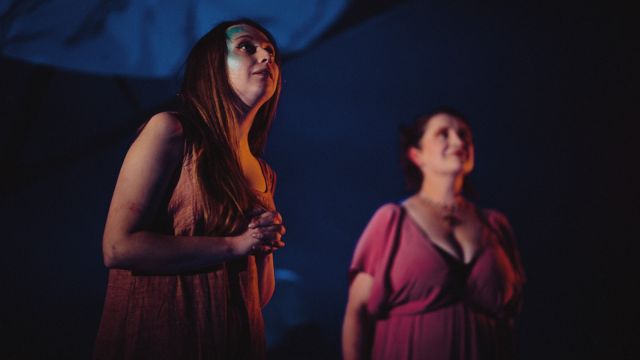Caligula
Albert Camus, well aware of the imminent victory of the fascist Nationalists in the Spanish Civil War across one border, and the rise of Hitler and the Nazis across another, began writing Caligula in 1938. The play underwent extensive revisions and was not staged until 1945 – by which time Camus had lived through the Nazi Occupation and played an important role in the French resistance. The French public too could not ignore the collaboration of the Vichy regime with the Nazis, and the death camps and destruction across Europe. The play, then very much of its time, was a huge success.

Producers Jessica Doutch and Robert Johnson have clearly decided the play is very much of this time. They have courageously mounted it with a cast of twelve, including the astonishing Liliana Dalton in the title role. Riley Tapp’s striking and disturbing set design, enhanced by Tom Bonser’s lighting, is dominated by a huge distorting mirror – which might also be the moon – the possession of which is Caligula’s first crazy demand. Why does he want the moon? Because he is the Emperor, and he does not have it.

Camus took the eponymous Caligula – a real historical figure, Emperor of Rome 37 to 41 CE, a cruel and insane tyrant – and used his atrocities as a vehicle for his own philosophical and psychological investigations into the nature of ‘freedom’ and the ‘Absurd’. If Life is ‘absurd’ – i.e., meaningless – what are the limits of freedom? We learn in scene one that the young Emperor began his rule well, but with the death of Drusilla – his sister and lover – he makes a radical change, claiming to have made a radical discovery: ‘Men are dying, and they are not happy.’ He sets out to prove that logically there are no limits to freedom – or his freedom - via a reign of terror: arbitrary murder, torture, grand larceny, forced adultery and prostitution. He reminds his terrified and supine patrician senators ‘I ‘can do anything I like.’

This is a play of ideas. There is no ‘character development’. We might even say that it runs out of ideas because its conclusion is inescapable and therefore obvious.
In scene after scene, in which Caligula expounds his rationale, he demonstrates only his pursuit of ‘logic’ and absolute freedom – which means he becomes worse and worse, pushing aside every shred of compassion or morality. Camus retains the historical record of Caligula’s atrocities but substitutes supposedly philosophical enquiry as the cause rather than madness. There are ‘characters’, certainly – and the cast here give some human plausibility to them – but essentially they are ‘types’ whose function is to be examples, foils or the exponents of opposing views. They do not last long.

Camus pointedly allows the ruling class no resistance, only whining. They are terrified, mortified, and debased, but they accept, they go along – an echo into our present. Another modern echo is the character of Caligula’s confidant and advisor, Helicon – always cool, always ‘rational’, claiming to be hors de combat, and making constant references to… lunch.
Here, in the difficult acoustics of the Theatre Works space, the play just about survives the shouty, hammy acting of much of the cast. Especially in a philosophical play like this garbled, incomprehensible dialogue is particularly frustrating. (There are notable exceptions, in the actors playing Helicon, Scipio and Caesonia, but the program merely lists the cast without specifying who plays what, so no names for commendation.) To what end too, the gender bending casting of some of the patricians? Here it’s merely confusing.

The play also survives the extravagant and misleading claims made in the program – such as the play being ‘a wild cross between American Psycho and RuPaul’s Drag Race’. Likewise, ‘There will be blood. And glitter.’ Blood, yes, glitter not so much. Audiences attracted by this stuff may well be disappointed.
What holds it all together, apart from the set and costume design, is Liliana Dalton’s performance. It is a bold - and successful – casting decision. Here, the gender bending works and in mysterious ways: androgynous Caligula is vulnerable, almost frail, even while being determinedly insane and terrifying. Caligula, after all, has absolute power. He/she is at his/her most cruel and terrifying in Act II when he/she sprawls on the throne, like a mock goddess, crown askew and dressed up with large false breasts and a pregnant abdomen. There is the manic grin that accompanies the arbitrary cruelty, the orders to murder, and the humiliations of the patricians – but behind that near grotesque grin we sense the despair and fear of a child.

Dalton commits so totally to the role that by the end, covered in and dripping blood, she appears exhausted – as indeed is her character because, of course, Caligula’s macabre philosophising leads nowhere, and he/she is utterly alone. Dalton is riveting, utterly compelling. A brilliant bit of direction introduces Caligula at the start. The patricians are searching for their Emperor Caligula with much hubbub. As it settles, Caligula is revealed, uncoiling in their midst. He/she has been there all the time. A fine metaphor.
Caligula is not a great play. What it enacts and what its central character discovers may seem rather obvious, even naïve or immature. Nevertheless, when we think of totalitarians like Trump, Orban, or Xi Jinping – those who want, or have, absolute power, the play has a contemporary resonance that emerges strongly from this production.
Michael Brindley
P.S. Lore Burns is credited as dramaturg, but the translator is not specified.
Photographer: Jack Dixon-Gunn
Subscribe to our E-Newsletter, buy our latest print edition or find a Performing Arts book at Book Nook.

